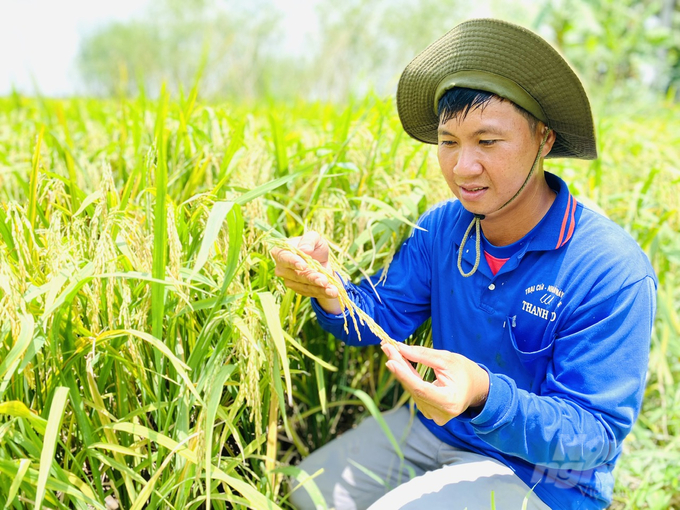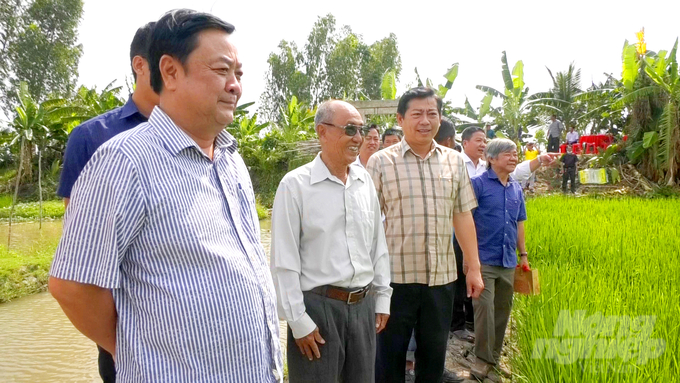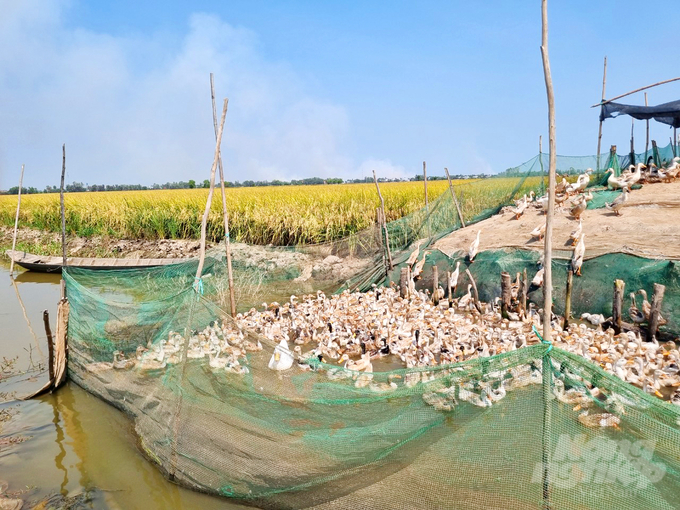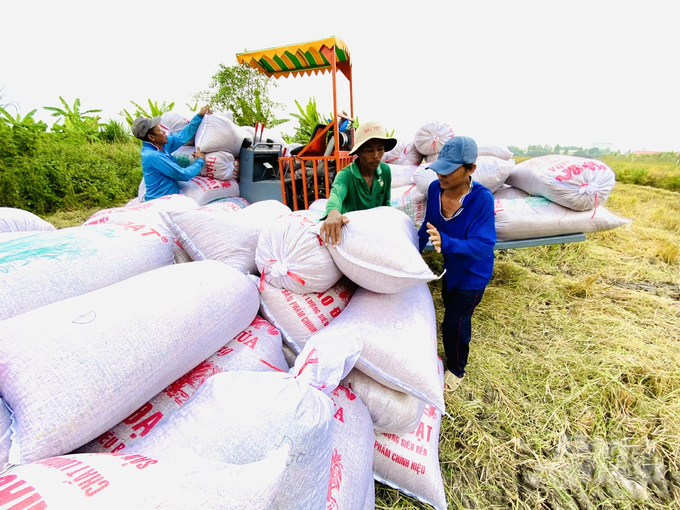June 18, 2025 | 06:20 GMT +7
June 18, 2025 | 06:20 GMT +7
Hotline: 0913.378.918
June 18, 2025 | 06:20 GMT +7
Hotline: 0913.378.918

Mr. Nguyen Minh Tuan, leader of the Quyet Tien Cooperative in Phu Thanh A Commune, Tam Nong District, beside the rice - fish - duck model, reports relatively high yields. Photo: Le Hoang Vu.
Tam Nong District in Dong Thap Province is one of the leading areas in this region implementing cyclical eco-friendly rice farming coupled with linking to agricultural product consumption. In August, the Mekong Delta enters the rainy season, and local farmers are busy harvesting the summer - autumn rice crop.
This season, the rice yields an average of 6 to 6.2 tons per hectare, with some fields exceeding 6.4 tons per hectare. Farmers have partnered with businesses and traders to purchase fresh rice directly from the fields at prices ranging 0.3 USD/kg for OM18 and OM4900 varieties, while OM5451 rice is priced at 0.2 to 0.3 USD/kg. With these selling prices, after deducting all costs, farmers earn an average profit of 800 to 960 USD/ha or more.

Minister of Agriculture and Rural Development Le Minh Hoan visited the Eco - Friendly Rice - Fish - Duck Farming Model at Quyet Tien Cooperative in Phu Thanh A Commune, Tam Nong District (Dong Thap). Photo: Le Hoang Vu.
The eco - friendly rice farming model combined with fish and duck raising, covering 20 hectares and managed by over 10 households in the Quyet Tien Cooperative (Phu Thanh A Commune, Tam Nong District) under the leadership of Mr. Nguyễn Minh Tuan, has just completed its harvest. The rice yields an average of 6 tons per hectare and is sold at 0.3 USD/kg. After deducting costs, farmers make a profit of nearly 1.120 USD/ha. In addition, the households earn several hundred dollars/ha/crop from raising ducks and wild fish in the rice fields.
Mr. Nguyen Minh mentioned that this is the fifth rice crop produced under the "responsible agriculture" model. The cooperative’s rice - fish - duck model has helped reduce rice production costs by about 30% compared to conventional methods. By understanding the crucial growth stages of the rice plants, farmers can proactively manage pests and diseases. Additionally, using the cluster seeder machine from Saigon Kim Hong Company has reduced the seeding rate from 140 - 160 kg/ha to 60 - 70 kg/ha. Applying organic fertilizers and incorporating ducks and wild fish into the fields not only saves labor and costs for pest control but also increases income.
Especially in the summer - autumn rice crop, he also uses the biological product Emuniv to decompose straw before sowing. This method turns the straw into effective organic fertilizer, which is then used to benefit the crops.

Producing eco - friendly rice combined with fish and duck farming in rice fields yields a profit of 1.120 USD/ ha. Additionally, farmers earn several hundred dollars/ha/crop from ducks and wild fish. Photo: Le Hoang Vu.
Before sowing the summer-autumn crop, Mr. Tuan chose a 5-hectare pilot area to use the microbial product Emuniv to decompose organic matter and improve the soil through two methods:
Method 1: After harvesting the rice, the straw is chopped and then 10 kg of organic fertilizer is mixed with 250 grams of Emuniv and evenly spread over 1,000 square meters of the field. After that, the field is plowed and left for 20 to 25 days. When the straw is decomposed and there is no foul smell, sowing can proceed.
Method 2: After harvesting, the combine harvester spreads the straw on the field without chopping it. Organic fertilizer and the microbial product are mixed in the same proportions as in Method 1 and then evenly distributed over the field. Water is added to the field, and after 15 to 20 days, the soil is plowed and sowing can begin.
According to the results of the pilot model evaluation, Mr. Tuan found that method 1 is more effective than method 2 because it reduces fertilizer costs by 15-20%, promotes stronger root development, results in sturdier rice plants that are less prone to lodging, and reduces the need for pest control sprays by 1-2 times. Notably, using the Emuniv product helps decompose toxic substances in the soil, improves soil quality, promotes healthy and vigorous rice growth, ensures high-quality crops, and protects the the producer's health.
Mr. Huynh Thanh Tung, Vice Chairman of Phu Thanh A Commune, Tam Nong District, stated that the eco - friendly agricultural model began to be implemented in the winter - spring crop of 2022 - 2023, with a total area of about 82 ha/crop, using the OM18 rice variety.
In this eco - friendly agricultural model, farmers are guided to apply various integrated technical solutions in the field, such as using a cluster seeder and applying organic fertilizers, as well as practicing intercropping with ducks and fish in the rice fields. This approach helps manage weeds, eliminate pests, and provides part of the organic fertilizer for the rice.
Using drones for pesticide spraying and electronic records for traceability. The application of these new production methods helps farmers enhance the economic efficiency of the model, with profits increasing by 120 - 160 USD/ha compared to traditional production. The production cost of organic rice in the model fields is also reduced compared to fields outside the model.

The profit of eco - friendly rice production increases by 120 - 160 USD/ha compared to traditional production. Photo: Le Hoang Vu.
Mr. Lam Trong Nghia, Deputy Director of the Tam Nông District Agricultural Service Center, stated that recently the district has been focusing on promoting sustainable organic agriculture with a rice - fish - duck model. Seeing the impressive results from the model, local farmers who grow organic rice are very encouraged as it contributes to protecting a clean environment.
According to Mr. , in the near future, the agriculture sector will continue to maintain and strongly develop this production model. Currently, the District People's Committee has also approved a plan allowing the Agricultural Service Center to develop a project for a modern, low - emission, circular agricultural model with an area of over 100 hectares. The components of this project will be implemented based on the existing eco - friendly agricultural model in Phu Thanh A Commune.

During the summer - autumn rice crop, farmers in the Quyet Tien Cooperative also use the biological product Emuniv to decompose straw into organic fertilizer for crop use. Photo: Le Hoang Vu.
The goal of the model is also to help farmers adopt advanced agricultural practices, reduce greenhouse gas emissions, and obtain carbon credits. This is a crucial task that the Tam Nong District agricultural sector is focused on implementing.
Minister of Agriculture and Rural Development Le Minh Hoan visited the Eco - Friendly Rice - Fish - Duck Farming Model in Phu Thanh A Commune, Tam Nong District (Dong Thap). The Minister praised the effectiveness of the model and suggested that local authorities and farmers continue to develop and expand rice - fish - duck production according to the organic, circular process, aiming to reduce emissions and increase farmers' profits. If suitable, farmers should consider raising more ducks to be released into the rice fields and establish partnerships with companies to both market rice and ducks, thus enhancing farmers' profitability.
Translated by Phuong Linh

(VAN) According to the Binh Thuan Department of Industry and Trade, in the first five months of 2025, Binh Thuan's dragon fruit export turnover increased by 20.65% compared to the same period last year.

(VAN) EU countries on Thursday gave final approval to new tariffs on fertilizer imports from Russia, a move aimed at cutting off revenue that could support Moscow’s war in Ukraine, despite concerns from European farmers.

(VAN) The working delegation from the Ministry of Agriculture and Environment conducted an important trip to the Netherlands to strengthen strategic partnerships and sustainable development in the agricultural sector.

(VAN) The letter ‘A Plea from the Ocean’ not only evokes emotion but also awakens the human conscience to the responsibility of protecting life on Earth.

(VAN) The Department of Agriculture in South Africa has announced the country’s first mass vaccination of poultry to prevent local birds from contracting avian influenza.

(VAN) Establishment of the Mekong Delta Regional Agricultural Linkage Center, aiming for a closed value chain, deep processing, trading platforms, and international market connectivity.

(VAN) Gia Lai province has recently recorded 460 rare species of animals and plants, contributing to forest conservation and biodiversity planning in the region.